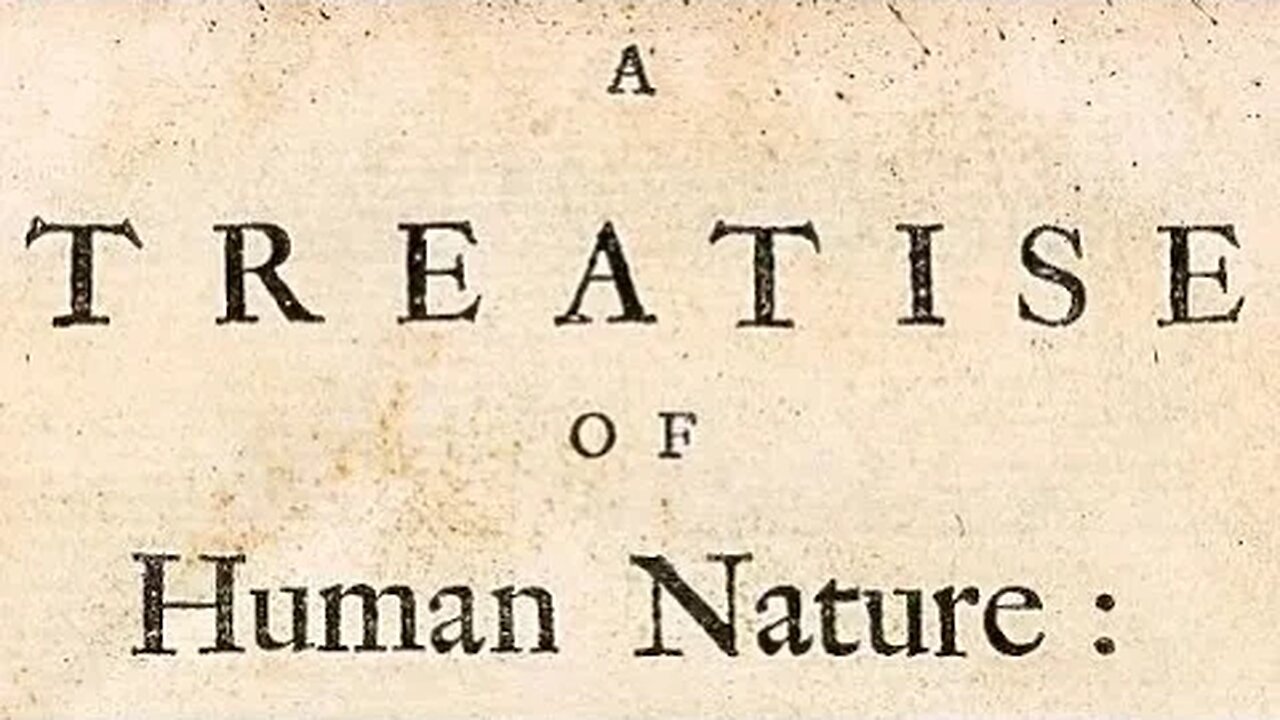Premium Only Content

A Treatise Of Human Nature - Hume deconstructed - part 27
This video references:
BOOK 1 - PART III. OF KNOWLEDGE AND PROBABILITY.
- SECT. XV. RULES BY WHICH TO JUDGE OF CAUSES AND EFFECTS.
I am deconstructing the groundbreaking book from 1739–40 by Scottish philosopher David Hume ("A Treatise of Human Nature: Being an Attempt to Introduce the Experimental Method of Reasoning into Moral Subjects"), considered by many to be Hume's most important work and one of the most influential works in the history of philosophy.
The Treatise is a classic statement of philosophical empiricism, scepticism, and naturalism. In the introduction Hume presents the idea of placing all science and philosophy on a novel foundation: namely, an empirical investigation into human nature.
Impressed by Isaac Newton's achievements in the physical sciences, Hume sought to introduce the same experimental method of reasoning into the study of human psychology, with the aim of discovering the "extent and force of human understanding". Against the philosophical rationalists, Hume argues that the passions, rather than reason, cause human behaviour.
He introduces the famous problem of induction, arguing that inductive reasoning and our beliefs regarding cause and effect cannot be justified by reason; instead, our faith in induction and causation is caused by mental habit and custom. Hume defends a sentimentalist account of morality, arguing that ethics is based on sentiment and the passions rather than reason, and famously declaring that "reason is, and ought only to be the slave to the passions". Hume also offers a sceptical theory of personal identity and a compatibilist account of free will.
Contemporary philosophers have written of Hume that "no man has influenced the history of philosophy to a deeper or more disturbing degree", and that Hume's Treatise is "the founding document of cognitive science" and the "most important philosophical work written in English" (Wikipedia : https://en.wikipedia.org/wiki/A_Treatise_of_Human_Nature)
Public domain versions:
https://www.gutenberg.org/cache/epub/4705/pg4705-images.html
https://gutenberg.org/ebooks/4705
https://web.archive.org/web/20060820100015/http://etext.library.adelaide.edu.au/h/hume/david/h92t/
The Librivox audiobook used in the video (my thanks goes to the narrator):
https://librivox.org/group/482?primary_key=482&search_category=group&search_page=1&search_form=get_results
-----
Mandibil Discord Forum:
https://discord.gg/nnAYvDt6dU
Mandibil on Youtube: https://www.youtube.com/@mandibil
Mandibil on Odysee: https://odysee.com/@mandibil:5
Mandibil on Rumble: https://rumble.com/c/c-1245151
Mandibil on Twitter: https://twitter.com/rekj1966
Patreon: https://www.patreon.com/Mandibil?fan_...
Subscribestar: https://www.subscribestar.com/mandibil
(Crypto donation addresses available from the Forum)
Brave: https://brave.com/nfb128
Presearch: https://presearch.org/signup?rid=1694301
Fair use appeal: For purposes such as criticism, comment, news reporting, scholarship, and research. Fair use is a use permitted by copyright statute that might otherwise be infringing. Non-profit, educational or personal use tips the balance in favour of fair use !
#hume #treatise #philosophy
-
 1:42:21
1:42:21
The Quartering
9 hours agoTrump To INVADE Mexico, Take Back Panama Canal Too! NYC Human Torch & Matt Gaetz Report Drops!
88.9K89 -
 2:23:15
2:23:15
Nerdrotic
8 hours ago $10.10 earnedA Very Merry Christmas | FNT Square Up - Nerdrotic Nooner 453
67.4K6 -
 1:14:05
1:14:05
Tucker Carlson
8 hours ago“I’ll Win With or Without You,” Teamsters Union President Reveals Kamala Harris’s Famous Last Words
150K296 -
 1:58:31
1:58:31
The Dilley Show
8 hours ago $30.88 earnedTrump Conquering Western Hemisphere? w/Author Brenden Dilley 12/23/2024
125K31 -
 1:09:59
1:09:59
Geeks + Gamers
9 hours agoSonic 3 DESTROYS Mufasa And Disney, Naughty Dog Actress SLAMS Gamers Over Intergalactic
83.7K20 -
 51:59
51:59
The Dan Bongino Show
10 hours agoDemocrat Donor Admits The Scary Truth (Ep. 2393) - 12/23/2024
807K2.66K -
 2:32:15
2:32:15
Matt Kohrs
21 hours agoRumble CEO Chris Pavlovski Talks $775M Tether Partnership || The MK Show
121K31 -
 28:23
28:23
Dave Portnoy
21 hours agoDavey Day Trader Presented by Kraken - December 23, 2024
155K42 -
 59:29
59:29
BonginoReport
12 hours agoTrump, Murder Plots, and the Christmas Miracle: Evita + Jack Posobiec (Ep.110) - 12/23/2024
161K131 -
 2:59:14
2:59:14
Wendy Bell Radio
15 hours agoNothing To See Here
129K75